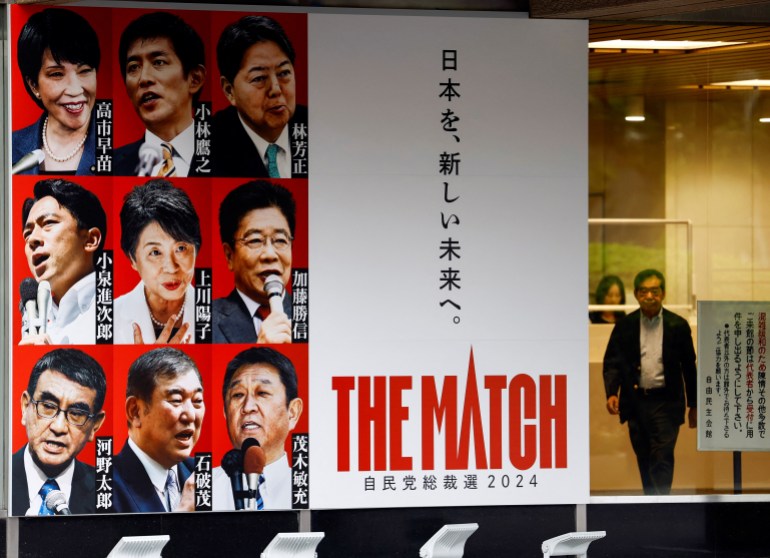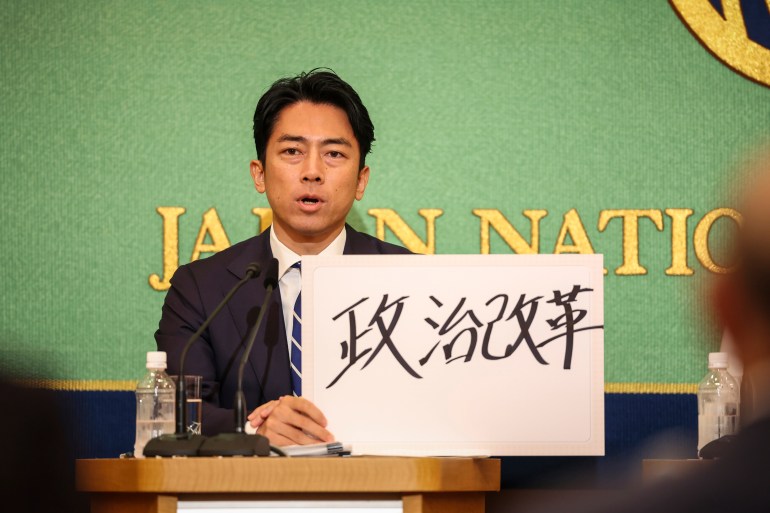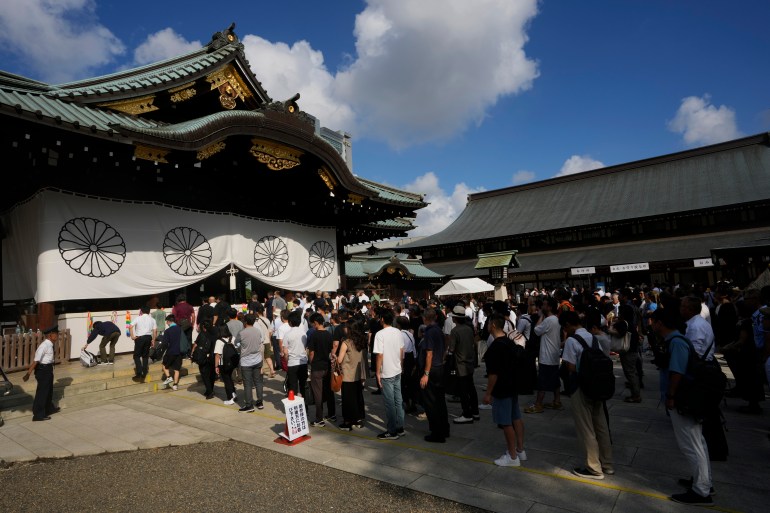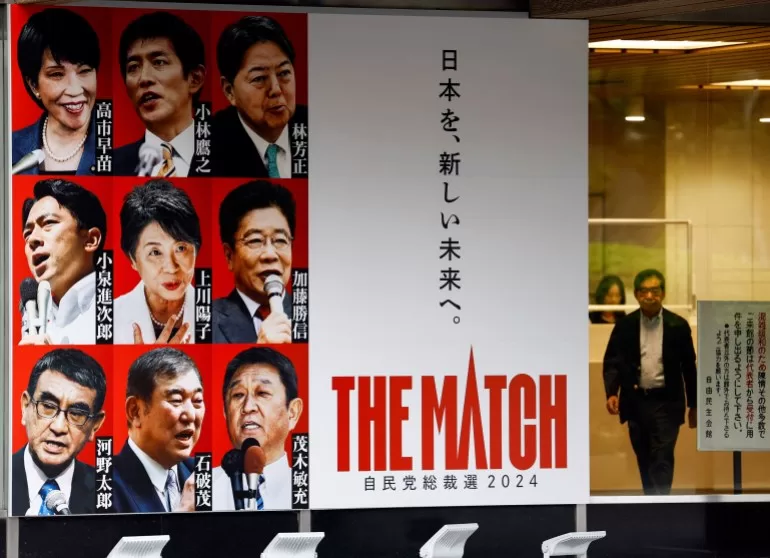Japan’s governing party will choose a new leader on Friday to replace Fumio Kishida who announced his resignation in August.
The winner of the contest for leadership of the Liberal Democratic Party (LDP), the largest in parliament, will become the country’s next prime minister. Most analysts expect the new leader to call a snap election to secure a mandate from voters.
A record nine candidates have been campaigning and the break-up of the LDP’s usual power structures as a result of a series of corruption scandals have made it harder to predict the outcome.
Many candidates “have claimed that ‘I’m the one who can handle Trump’ or ‘I’m the one who can stand up to China’”, Jeffrey J Hall, a lecturer at Kanda University of International Studies, told the AFP news agency.
But there are significant differences in their approach to such issues, and although some of the nine have “no hope whatsoever”, the race remains “a toss-up”.
“This is the most unpredictable that an LDP election has been in many years,” Hall said.
The first round of voting starts at 1pm (04:00 GMT) with the eventual winner expected to hold a news conference at about 6pm (09:00 GMT). The contest might also produce Japan’s first woman or youngest-ever prime minister.

Here are some of the more prominent contenders:
Shigeru Ishiba, 67
A former defence minister, Shigeru Ishiba is popular with the public but has failed four times to secure the post of party leader.
Ishiba’s campaign has focused heavily on security issues, and he has indicated he will push for more oversight over Washington’s use of its bases in Japan, and also for Japan to have a say in how the US might use its nuclear weapons in Asia. Other suggestions have included the creation of an ‘Asian NATO’.
On the economy, the 67-year-old has questioned the Bank of Japan’s maverick interest rate policy. A former agriculture minister, he has also called for more efforts to address rural depopulation.
Takeshi Iwaya, one of the LDP legislators supporting Ishiba’s candidacy, describes the veteran politician as a man with a “sincere and honest attitude towards politics”.
Ishiba graduated from Keio University with a law degree. He enjoys making military models, including one of a Soviet aircraft carrier for the visit of a Russian defence minister, as well as trains and 1970s pop idols.
Shinjiro Koizumi, 43
The 43-year-old son of popular former Prime Minister Junichiro Koizumi has positioned himself as the change candidate, with the vision and charisma to help the party rebuild after its recent scandals.
Koizumi was first elected to parliament in 2009 and established his credentials by working on reconstruction in eastern Japan following the devastating 2011 earthquake. He was environment minister under the administration of Shinzo Abe who was assassinated in July 2022, as well as that of his successor Yoshihide Suga.
Koizumi has supported the development of renewables. Unusually, he also took paternity leave for the birth of his children.
He has promised to hold a snap election if he wins the party leadership.
“With the rapidly declining birthrate and ageing population, we need leaders who have the antennae and sensibility to pick up on diverse voices, including those of young people and women,” said Ayuko Kato, an LDP legislator backing Koizumi’s candidacy.

Koizumi has an economics degree from Kanto Gakuin University, and a master’s from Columbia University, He also spent time working at the US think tank Center for Strategic and International Studies (CSIS).
He enjoys surfing and in July spent a day at the beach with US ambassador to Japan, Rahm Emanuel.
Sanae Takaichi, 63
Sanae Takaichi, whose hero is former British Prime Minister Margaret Thatcher, could follow in her idol’s footsteps to become her country’s first woman prime minister.
A vocal nationalist popular with the LDP’s conservative faction, Takaichi was close to Abe, whose supporters within the party remain powerful.
She has aroused controversy with her promise to visit the Yasukuni Shrine, which honours Japan’s war dead including a number of convicted war criminals.
Japanese leaders stopped going to the shrine in 2013 amid criticism from the US and condemnation from South Korea, China and other nations that see it as a symbol of Japan’s wartime aggression.
The 63-year-old, who is currently the minister of state for economic security, also supports a strong military and nuclear power and is against social change on issues such as same-sex marriage.
She previously ran for leadership in 2021 when she had Abe’s support.
Takaichi is a graduate of the Matsushita Institute of Government and Management.

Taro Kono, 61
Taro Kono, currently minister for digital transformation, is an experienced and outspoken reformist who also ran for leadership in 2021.
Kono has held multiple jobs at ministerial level, including foreign affairs and defence, and is seen as one of the more liberal candidates. The 61-year-old has amassed 2.5 million followers on social media platform X.
Opposed to nuclear power after the 2011 quake and nuclear disaster, he has since softened his stance amid growing demands for energy from AI data centres.
Kono was first elected to parliament in 1996. He graduated from Georgetown University in the US.
Yoko Kamikawa, 71
Currently foreign minister, Yoko Kamikawa was the last to join the race for the presidency, announcing her candidacy on September 11.
She is serving her seventh term in the House of Representatives and was appointed to her first cabinet post in 2006 under Abe.
The 71-year-old has won plaudits for her work on the international stage, including a visit to Kyiv, but reportedly struggled to secure the support she needed to run as a candidate.
Kamikawa graduated from the University of Tokyo and later took a master’s in public policy from Harvard University. This is her first bid for LDP leadership.
Hayashi Yoshimasa, 63
Currently Kishida’s chief cabinet secretary, Yoshimasa is a veteran politican who is in his second campaign for party leader.
He has served in six cabinets with portfolios from defence to economic policy, culture and foreign affairs.
A law graduate from the University of Tokyo, he also has a master’s in public policy from Harvard.
